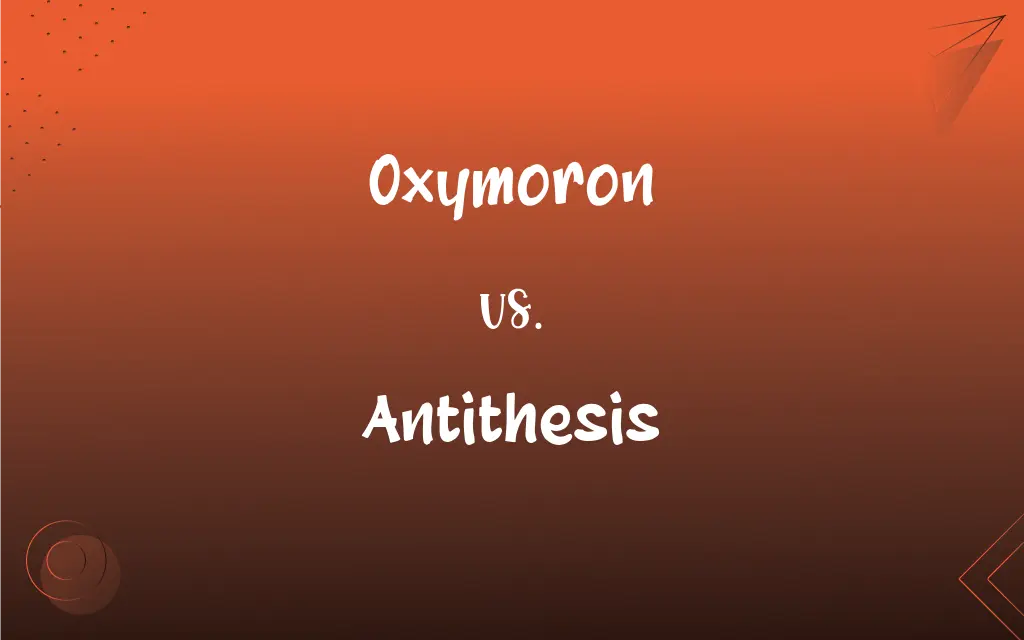Oxymoron vs. Antithesis: What's the Difference?
Edited by Aimie Carlson || By Janet White || Updated on February 15, 2024
An oxymoron is a figure of speech combining contradictory terms, such as "bittersweet," while an antithesis is a rhetorical device contrasting opposing ideas, often in parallel structure, for emphasis or effect.

Key Differences
Oxymoron and antithesis are both literary devices, but they serve different purposes. An oxymoron is a figure of speech that combines two contradictory terms, creating a paradoxical effect. On the other hand, antithesis is a rhetorical device that juxtaposes contrasting ideas, often in parallel structure, to highlight their differences.
An oxymoron is a compact paradox that brings together two opposing terms, an antithesis involves a broader comparison of ideas or concepts. The purpose of an oxymoron is often to create a striking or memorable phrase, while the purpose of an antithesis is to emphasize the contrast between two ideas or concepts.
In literature, oxymorons are often used for poetic or dramatic effect, adding depth and complexity to descriptions. Antithesis, on the other hand, is commonly used in speeches and writing to persuade or convince the audience by highlighting the stark differences between opposing viewpoints.
Both oxymoron and antithesis involve the use of contrast, an oxymoron focuses on the paradoxical combination of words, whereas antithesis emphasizes the opposition between ideas or concepts.
Comparison Chart
Definition
Combines contradictory terms
Contrasts opposing ideas
ADVERTISEMENT
Focus
Paradoxical effect
Emphasis on differences
Structure
Compact, two-word phrase
Often involves parallel structure
Purpose
Create striking or memorable phrases
Highlight contrast to persuade or convince
Examples
"Bittersweet," "living death"
"It was the best of times, it was the worst of times"
Oxymoron and Antithesis Definitions
Oxymoron
Combining opposites.
The phrase open secret is an oxymoron.
ADVERTISEMENT
Antithesis
Opposite concepts.
Freedom is the antithesis of slavery.
Oxymoron
Two opposing words.
Clearly confused is an oxymoron.
Antithesis
Balanced opposition.
Love is the antithesis of hate.
Oxymoron
Paradoxical phrase.
Jumbo shrimp is a classic oxymoron.
Antithesis
Juxtaposition for effect.
Youth is the antithesis of age.
Oxymoron
Contradictory terms together.
Act naturally is an oxymoron.
Antithesis
Contrasting ideas.
The antithesis of good is evil.
Oxymoron
Unexpected pairing.
Awfully good is an oxymoron.
Antithesis
Rhetorical contrast.
Action is the antithesis of inaction.
Oxymoron
A rhetorical figure in which incongruous or contradictory terms are combined, as in a deafening silence and a mournful optimist.
Oxymoron
(rhetoric) A figure of speech in which two words or phrases with opposing meanings are used together intentionally for effect.
Oxymoron
A contradiction in terms.
Oxymoron
A figure in which an epithet of a contrary signification is added to a word; e. g., cruel kindness; laborious idleness.
Oxymoron
Conjoining contradictory terms (as in `deafening silence')
FAQs
Can an oxymoron be a form of antithesis?
Yes, an oxymoron can be considered a compact form of antithesis.
Can an oxymoron be more than two words?
Typically, an oxymoron is a two-word phrase, but it can be extended in a phrase or sentence.
What is an antithesis?
An antithesis is a rhetorical device that contrasts opposing ideas, often in parallel structure.
Is antithesis only used in literature?
No, antithesis is used in various forms of writing and speech, including literature, speeches, and essays.
Can antithesis be used in poetry?
Yes, antithesis is often used in poetry to create emphasis and contrast.
Are oxymorons common in everyday language?
Yes, oxymorons are common in everyday language, often used for humor or emphasis.
How does antithesis enhance writing?
Antithesis enhances writing by emphasizing contrasts and creating a clear distinction between ideas.
What is an oxymoron?
An oxymoron is a figure of speech that combines two contradictory terms.
Are oxymorons always intentional?
In literature and rhetoric, oxymorons are usually intentional, but they can also occur unintentionally in everyday language.
What is the purpose of using an oxymoron?
The purpose of using an oxymoron is to create a memorable, paradoxical effect.
Can antithesis be found in non-fiction writing?
Yes, antithesis can be found in non-fiction writing, especially in persuasive or argumentative texts.
Is antithesis always used for contrast?
Yes, antithesis is always used to highlight contrast between opposing ideas or concepts.
What is an example of an oxymoron in literature?
"Parting is such sweet sorrow" from Shakespeare's Romeo and Juliet is an example of an oxymoron.
How does antithesis contribute to persuasion?
Antithesis contributes to persuasion by clearly presenting opposing viewpoints, making arguments more compelling.
How does antithesis affect the tone of a speech?
Antithesis can affect the tone of a speech by adding emphasis and drama, making it more impactful.
What is the difference between antithesis and juxtaposition?
Antithesis involves contrasting ideas, often in parallel structure, while juxtaposition is the mere placement of contrasting elements side by side.
Can an oxymoron be used in a metaphor?
Yes, an oxymoron can be used in a metaphor to create a vivid, paradoxical image.
How do oxymorons and antitheses differ in their impact on the reader?
Oxymorons create a striking, paradoxical effect, while antitheses emphasize the distinction between opposing ideas, potentially leading to deeper reflection.
Are all contradictory phrases oxymorons?
Not all contradictory phrases are oxymorons; the terms must be closely linked to create a paradoxical effect.
Can a single word be an oxymoron?
Typically, an oxymoron consists of two words, but some single words can have oxymoronic qualities, like "bittersweet."
About Author
Written by
Janet WhiteJanet White has been an esteemed writer and blogger for Difference Wiki. Holding a Master's degree in Science and Medical Journalism from the prestigious Boston University, she has consistently demonstrated her expertise and passion for her field. When she's not immersed in her work, Janet relishes her time exercising, delving into a good book, and cherishing moments with friends and family.
Edited by
Aimie CarlsonAimie Carlson, holding a master's degree in English literature, is a fervent English language enthusiast. She lends her writing talents to Difference Wiki, a prominent website that specializes in comparisons, offering readers insightful analyses that both captivate and inform.































































